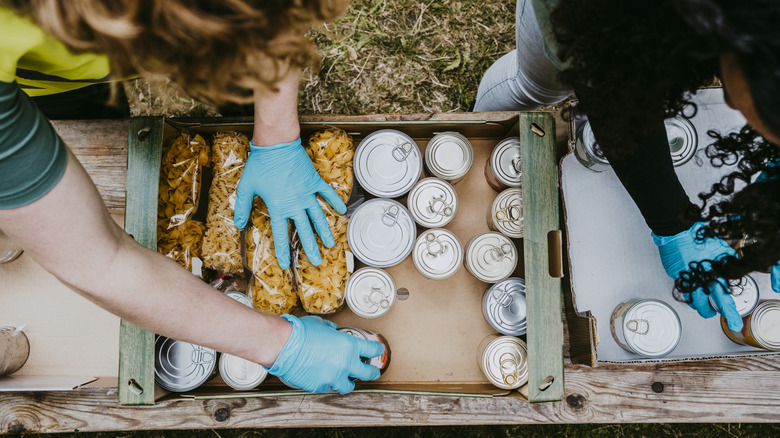Hurricane Prep: The Food Safety Mistake You Need To Avoid
Preparedness is only one aspect of getting through dangerous storms such as hurricanes, but food safety must also be considered. According to the U.S. government site, FoodSafety.org, if you have any doubts about the safety of the food you have on hand, toss it in the trash. It's better to be safe than sorry, and the last thing you need when you're coping with a potentially life-threatening situation is a case of food poisoning.
One of the most important things to never do when determining whether or not a food is safe to eat is to taste it. Even a small taste of spoiled food can make you very sick. Giving food a sniff before tasting it may only sometimes help, as the smell cannot detect the presence of bacteria that may have gotten into the food.
Canned goods are just one of the food items to stock up on before a hurricane. Tuna and beans are excellent protein sources, and certain canned fruits provide vitamin C and fiber. However, if a can is damaged in any way, the contents may have been contaminated, and it should be thrown out. In addition, any food that has had contact with flood water must be discarded.
When in doubt, throw it out
The Centers for Disease Control (CDC) says food will stay cold in the fridge for up to four hours and in the freezer for 24-48 hours. Keep the door shut and avoid opening it as much as possible to prevent the cold air from escaping. Move food from the fridge to the freezer and then to a cooler if necessary.
Foods in non-waterproof containers such as boxes or paper bags should be thrown away. Make sure you thoroughly inspect any food that may have gotten wet. Food poisoning is nothing to mess with, so remember what the USDA says, "When in doubt, throw it out," and don't taste it under any circumstances. Symptoms of food poisoning include vomiting, diarrhea, cramps, and stomach pain, and dehydration can happen quickly with vomiting and diarrhea. You don't want to take any chances with your health at a time when first responders may not be able to reach you or are otherwise occupied with other emergencies.

